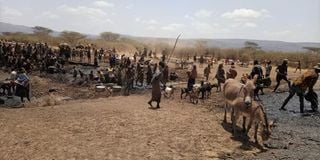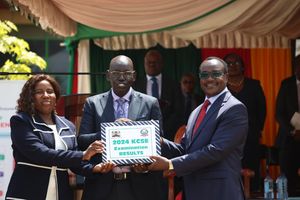Nanok appeals for help as drought, hunger ravage Turkana

Residents of Lorumor village in Turkana County gather their animals at a muddy water point. Governor Josphat Nanok has appealed to the national government to help feed thousands of people in the county currently starring at starvation due to drought.
Turkana Governor Josphat Nanok has appealed to the national government, through the Ministry of Devolution and Arid and Semi-Arid Lands, to help feed thousands of people in the county currently starring at starvation due to the devastating effects of drought.
Mr Nanok said that immediate drought mitigation strategies currently required are relief food distribution, water provision for both people and livestock as well as distribution of livestock feeds, mass vaccination and treatment of livestock.
"I call upon the Ministry of Devolution through deputy county commissioners to also request for adequate food for families affected by the drought," the county boss said.
Mr Nanok said that his administration has procured relief food that will be distributed to affected locals in all the seven sub-counties.
"Kibish and Turkana North sub-counties that are the worst hit are being prioritised in the first batch of relief food distribution," Mr Nanok said.

A family in Lorumor village digging a well in search of water as drought continues to ravage Turkana County.
Water availability
The governor, who last week toured some centres in Turkana North Sub-County that include Kataboi, Lowareng'ak, Lokitoe Ang'aberu, Katiko and Todonyang, asked his deputy, Peter Lotethiro, who is currently acting as County Water Executive, to ensure the there is a conclusive report on the status of water availability in the county.
"With support from development partners, we are moving swiftly to address specific needs of villages across the county.
In Lokitoe Angaberu village in Turkana North, Sh3.2 million is being spent to construct a pipeline to locals and nearby school thereby reducing distance the locals cover in search of the commodity," Mr Nanok said.
He also noted that with support from development partners, the county government has established a Sh15 million water project at Lowareng'ak centre.
He noted that the county will invest in water trucking to ensure remote villages whose water sources have dried up or broken down due to overuse have access to the comodity.
A spot check by the Nation in Lorumor village in Kibish Sub-County revealed that reliable springs and boreholes that pastoralists and their huge number of livestock depend on are either muddy or have dried up.
Naamz Kaleng, a resident, said that locals in affected kraals that include Morutorong, Kadu, Lokwanamor, Ngang'ololin and Ng'isowa are purely pastoralists and the distance from the grazing fields to the nearest centre at Lorumor is nearly 70 kilometres.
"Water from the two springs that are currently drying up is shared by both human beings and animals. There are no more shallow wells and to get water that is obviously salty, it takes at least four days to dig a well and get to the water table," Mr Kaleng said.
The locals also want to be protected from water borne disease, noting that cases of diarrhoea are on the rise due to drinking contaminated water.





